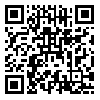BibTeX | RIS | EndNote | Medlars | ProCite | Reference Manager | RefWorks
Send citation to:
URL: http://hdq.uswr.ac.ir/article-1-131-en.html

 , Mahsa Hami2
, Mahsa Hami2 
 , Abdollah Dargahi3
, Abdollah Dargahi3 
 , Mohsen Poursadeghiyan4
, Mohsen Poursadeghiyan4 
 , Mehrdad Farrokhi *5
, Mehrdad Farrokhi *5 
 , Reyhaneh Ivanbagha6
, Reyhaneh Ivanbagha6 
 , Mohammad Masood Khalesi7
, Mohammad Masood Khalesi7 

2- Department of Economic Development and Planning, Firoozkuh Branch, Islamic Azad University, Firuzkuh, Iran.
3- Department of Environmental Health Engineering, School of Health, Hamadan University of Medical Sciences, Hamadan, Iran.
4- Research Center in Emergency and Disaster Health, University of Social Welfare and Rehabilitation Sciences, Tehran, Iran.
5- Research Center in Emergency and Disaster Health, University of Social Welfare and Rehabilitation Sciences, Tehran, Iran. ,
6- Department of Midwifery, School of Nursing and Midwifery, Ardebil University of Medical Sciences, Khalkhal, Iran.
7- Department of Basic Sciences, School of Rehabilitation Sciences, Iran University of Medical Sciences, Tehran, Iran.
Background: Consumption of healthy and hygienic foods is imperative to live a healthy life. This issue is of greater importance when obtaining foodstuff is relatively tough. The countries prone to natural disasters should always be prepared for a crisis. The present study aims to investigate awareness among the students in Azad University of Medical Sciences regarding nutrition and storing foodstuff in case of crisis.
Materials and Methods: A descriptive-analytical method was used in the present study. The study participants included 1350 students in Azad University of Medical Science which were selected randomly from all students in the academic year 2015-2016. Experts confirmed the validity of the questionnaire and it was distributed among the students. The collected data was analyzed through SPSS version 16.
Results: Given the results of the study, only 35% of the participants had a good level of awareness, 38.5% had moderate awareness, and 26.5% had low level of awareness about nutrition and how to store food during crisis. No significant gender and age (α=0.05) difference was observed.
Conclusion: Health experts and authorities should be aware of nutrition safety and sampling risky foods. This process can be helpful in case of a crisis, especially during early hours of the crisis and after the settlement of the displaced population are essential. To that end, training the experts and authorities responsible for such situations can be helpful. Therefore, holding training courses and teaching for related authorities on how to prevent waterborne and foodborne disease can prevent from food poisoning outbreaks and high mortality rate.
Received: 2017/05/10 | Accepted: 2017/09/20 | Published: 2018/01/1
| Rights and permissions | |
 |
This work is licensed under a Creative Commons Attribution-NonCommercial 4.0 International License. |





